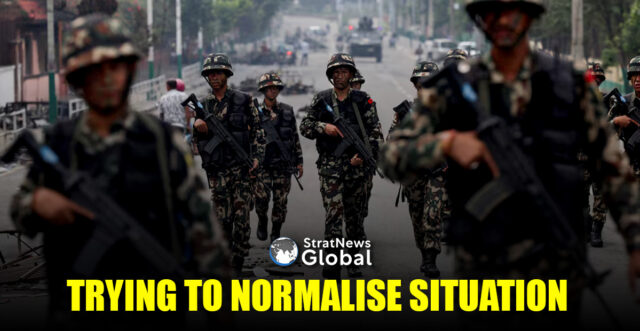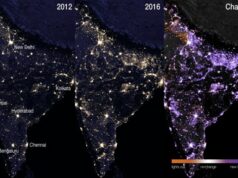Armed troops stood guard outside Nepal’s parliament on Wednesday, as Kathmandu remained under indefinite curfew after two days of deadly anti-corruption protests that led to Prime Minister K.P. Sharma Oli’s resignation.
The worst upheaval in decades in the Himalayan nation was unleashed by a social media ban announced last week but rolled back after 19 people died on Monday as police fired tear gas and rubber bullets to control crowds.
Burnt vehicles and twisted metal heaps littered the area around parliament, where army firefighters battled to douse a blaze in the main hall, while the exterior was charred after angry protesters set it ablaze on Tuesday.
Trying To Normalise Situation
“We are trying to normalise the situation first,” army spokesman Raja Ram Basnet said. “We are committed to protect the life and property of people.”
Armoured vehicles kept vigil in streets deserted except for a few strollers, with shops and markets shut.
Several other government buildings, from the supreme court to ministers’ homes, including Oli’s private residence, were also set ablaze in Tuesday’s protests, with the unrest subsiding only after the resignation.
Flights were disrupted, with the main airport in Kathmandu shut until 6 p.m. (1215 GMT), an airport spokesperson said.
Taks To Defuse Crisis
In an appeal on X, the army said prohibitory orders would stay until Thursday morning, adding that relevant parties were coordinating to tackle the situation after the protest and resolve the issue.
Media also said preparations were being made for authorities and protesters to hold talks, without giving details. Reuters could not independently confirm the information.
Former Supreme Court judge Balaram K.C. urged the protesters to set up a negotiation team, with the army helping to maintain law and order, and called for fresh elections.
“Parliament should be dissolved and fresh elections held,” the constitutional expert told Reuters. “They should discuss forming the next caretaker government.”
Jobs, Corruption Key Issues
Most of the protesters were young people voicing frustration at the government’s perceived failure to fight corruption and boost economic opportunities.
For years a lack of jobs has driven millions to seek work in countries such as Malaysia, the Middle East and South Korea, mainly on construction sites, so as to send money home.
Wedged between India and China, Nepal has struggled with political and economic instability since protests led to the abolition of its monarchy in 2008.
India Concerned
India’s security cabinet also met late on Tuesday to discuss the situation in its neighbour.
“Nepal’s stability, peace, and prosperity are of utmost importance,” Prime Minister Narendra Modi said in a post on X later. “I humbly appeal to all my brothers and sisters in Nepal to maintain peace and order.”
(With inputs from Reuters)





